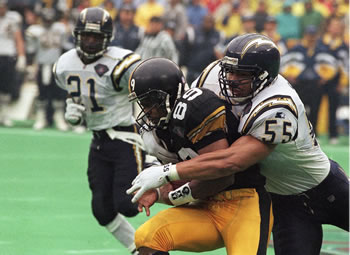Real Men Don’t Ask For Help

Seau at his best against the Steelers in 1995. AP photo
An obviously shaken Marcellus Wiley said Junior Seau often went to doctors outside of the organization to hide injuries. Seau wasn’t afraid of losing his job, only God and Father Time are powerful enough to take on that assignment. Seau did so because, like far too many men, he would not allow himself the luxury of being weak, of being human.
Competitors of that caliber come hardwired with a message, one perhaps most men carry to varying degrees, that handling pain and pressure is just part of the manly code. Seau didn’t invent the irreplaceable man, he was just its latest incarnation.
Wiley, a former Charger defensive end and now ESPN analyst, captured the fact and raw emotion that tears through families upon the discovery that a loved one’s pain had become so great that death seems the only solution.
“We were there for you. We knew you were a superstar. We knew you were a super person, but come out and tell us you needed us,” said a shaking Wiley on ESPN. “Junior did it his way. If he was hurting, you knew it but you wouldn’t see it. It’s just so tough, I think, for everyone around him, to know that Junior had something he was dealing with, that everyone was in debt to this guy and to help him in his time of need, and none of us were able to help him before this happened.”
The reports of Seau’s death shocked everyone, except, it seems, Hall of Fame linebacker Harry Carson, who told reporters the news, while sad, wasn’t unexpected. He has seen too many follow the same path and knows firsthand how utterly hopeless life can seem. Carson faced a similar decision in the mid-’80s, going so far as to consider committing suicide while driving over the Tappan Zee Bridge in New York. In 2010, Seau drove his own vehicle off the road near San Diego, causing speculation that he tried to kill himself then. Wiley recalled his conversation with Seau after the incident, asking him if he did, in fact, just fall asleep. Seau, known by everyone as Buddy Buddy – his preferred way of addressing old friends and new acquaintances – convinced his friend that he was just tired and that everything was fine.
In the sudden aftermath of his death, fans, reporters and commentators wondered aloud whether brain injuries had led to his decision or if Seau would become a martyr for the cause of better medical care and safer playing conditions. That may happen. But a more appropriate memorial would be the acknowledgement that it is OK to ask for help, that being a man doesn’t mean going it alone.
We hear it all the time, be a man, suck it up. We send our wives, girlfriends and children to the hospital for the most minor ailments but shrug off our own pain, as if seeking help is some admittance of weakness. Even now the headlines continue to praise Seau as a warrior. It’s perhaps the most sought-after label for any man, and it’s killing young men everywhere.
In 1999, BBC news reported suicide rates in the Scottish highlands were considerably higher than in other parts of the United Kingdom. It was felt that macho stereotypes and the nation’s “lad culture” – an idea that boys will be boys and that drinking and violence are just part of being a man – were to blame for a steep rise in suicides in men ages 15-24. The same issue was brought up a few years earlier in New Zealand.
A UN survey found the country to have the highest youth suicide rates of any industrialized country. In a New York Times article reporting on this sad phenomena, Rev. Felix Donnelly, a Roman Catholic priest who is the director of Youth Link, a program for troubled teens, said the country’s masculine culture was partly to blame for the suicide rate of young men that was 40 percent higher than in the United States. “You’re judged constantly on your maleness,” said Donnelly in the article. “It can be a very intolerant country. You must worship rugby and beer. And if you don’t, God help you. I think we’ve just been dreadful about this machoness.”
We all have.





